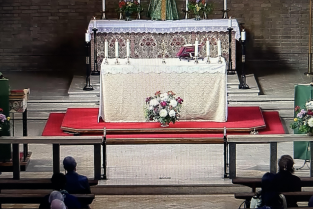Christians on the Left Statement on Assisted Dying

"Talking about the end of life is often not easy. Most of us can call to mind the experience of loved ones who have died or who are today nearing the end of their journey in this life. We recognise therefore that discussing this issue can touch us emotionally at a deep and passionate level. It is precisely because of this that policymakers have a responsibility to think through this issue rigorously, considering the ethical values at play and the possible consequences of change. It is the responsibility of policymakers to consider and make the arguments dispassionately, while informed by passionate experience.
As Christians - and as Christian Socialists - we believe that human beings are made in the image of God. There is a value in all human life, however young or old, healthy or terminally ill. This does not mean it should be prolonged beyond its natural end, but medicine usually understands this. We need to discuss end of life experiences more, drawing on the hospice movement which does so much often on a foundation informed by a Christian worldview.
However, what is being proposed in the forthcoming Private Members Bill is a change in the law to make it legal to assist someone to take their own life when they are faced with what they regard at that time as unbearable suffering. That is not the same as a decision to alleviate pain with a potential consequence of shortening the patient's life.
We believe that this legal change will mark a wider shift in the way our society regards human life, particularly how we view people who are terminally ill, elderly, disabled or otherwise vulnerable. We believe that it is naive to trust that 'safeguards' will limit the extent to which people are assisted to take their own lives, as the experience of countries like Canada demonstrates.
It is also naive to believe that people facing the end of life will be given a genuine choice about what to do. The majority of hospice care is voluntarily provided and funded, and while this country relies on (and underpays) many wonderful and professional carers, high-quality palliative care is not universally available. At present, the health and social care system is broken and often lets people down. The UK Covid-19 Inquiry was told that during the pandemic, some elderly and disabled people found 'Do Not Resuscitate' instructions were issued arbitrarily. Faced with no or limited social care options and full wards, in time there is real potential that similar pressure might be brought to bear on terminally ill patients to consider ending their lives. That would not be genuine choice nor treating people with dignity.
It is also likely that some patients will see themselves as a burden on their families and friends that they could alleviate by requesting assistance to end their life, and might even be encouraged to think that way. This bill inserts this weighing up of human life, even if unspoken, into the most intense circumstances for people at their most vulnerable. This is not progress.
At the very least, no decision on assisted dying should be made until we have ensured high quality end of life and palliative care are available to all. We should prioritise the establishment of a national commission on palliative care and end of life provision before even broaching the topic of assisted dying. This would be Christian Socialism in practice: the community doing all it can to value and cherish and care for the individual and, as a consequence, being a better society."


















